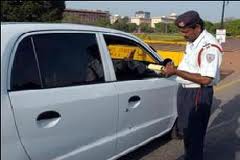
New Delhi, April 28: From May 4, if your car has black film on the front and rear windscreens that blocks light by more than 30% and the tint on the side window panes is more than 50%, then you could be in contempt of court in addition to being prosecuted as per the rules provided under the Motor Vehicles Act.
A bench of Chief Justice S H Kapadia and Justices A K Patnaik and Swatanter Kumar went by the limits prescribed in the MV Act and said anything beyond the visual light transmission (VLT) limit of 70% for the front and rear windshields and 50% for the side windows would be punishable.
The decision came on a PIL filed by Avishek Goenka, who had complained that cars with black film on window panes were being increasingly used for crimes, including sexual assault of women. He said though there was no express restraint on use of black film under the MV Act, it prescribed VLT limits.
Writing the judgment for the bench, Justice Kumar said, "On the plain reading of the rule, it is clear that cars must have safety glass having VLT at the time of manufacturing... In other words, the rule not impliedly but specifically prohibits alteration of such VLT by any means."
It's illegal, but tinted glass windows in cars in the city are a common sight. However, after the Supreme Court banned use of tinted glass beyond the permissible limit, such defaulters are going to have a tough time. Traffic police now intends to intensify the drive against use of tinted glass in vehicles.
There has been a traffic police drive against tinted car windows since last year. However, there has been a lull in the prosecutions this year, with only 9,279 such prosecutions till April 15 this year. Last year, for the same period, there had been as many as 30,582 prosecutions. Cops claim that better compliance has resulted in lower prosecutions.At present, car owners who are found not following the permitted percentage set for tinted glass have to either hand in their registration certificate or their driving licence along with the usual Rs 100 challan slapped on defaulters. "A notice is also issued to them by traffic police and the defaulter has to report to the area traffic inspector where the violation was recorded within 72 hours for inspection of the vehicle.
If the directions are not followed, the matter will be forwarded to the court," said joint commissioner of police (traffic) Satyendra Garg. As per the permissible limit there should be at least 70% transparency in the film on the front and rear windows while 50% transparency is required on the side windows."Usually, since the fine is just a meagre Rs 100, which is nothing compared to the money spent on films (ranging from Rs 700 to Rs 14,000 for the more fancy ones that protect from UV rays), it is not much of a deterrent to defaulters who continue to travel in the tinted vehicles. We hope that the stricter action will make the defaulters mindful of the rules," said a senior traffic police officer.Last year, as many as 45,649 vehicles with tinted glass were booked. "Significantly, a majority of these were repeat offenders, showing that despite being caught, Delhiites are mostly unmindful of the rules," said a senior traffic officer. This year, in a drive started on March 27, about 2,064 offenders have been booked till April 26.
Of them, 999 vehicle owners were made to remove the tinted film on the spot.The "Rules of Road Regulations, 1989" framed by the central government under Section 118 of the Motor Vehicles Act state that, "A driver of a motor vehicle and every other person using the road shall obey every direction given, whether by signal or otherwise, by a police officer or any authorized person for the time being in charge of the regulation of traffic." Under the rule, even a traffic constable has the power to issue notice to the defaulter, said traffic police. Tinted glass in vehicles has been a major source of concern for women's security as well as criminal activities. Delhi Police had earlier sent a proposal to the Union home ministry to amend the Motor Vehicles Act to enhance fines on use of tinted glass. The amendment is expected to increase the fine to a minimum of Rs 500. Tinted car windows have helped criminals especially in cases of rape and murder.






Comments
Add new comment